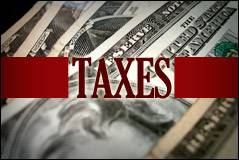Media

Taxes Hinder Pennsylvania’s Progress
It may be boring and complicated, but a state’s tax code has a real impact on individuals and families who want to improve their quality of life. For instance, if Pennsylvanians are required to spend countless hours and dollars complying with Harrisburg’s complex tax laws, this leaves less time to invest in a business or save for the future.
Tax reformers often focus on the amount of revenue raised by a particular proposal. But the real focus should be on creating a tax climate that allows people to more easily improve their well-being. With this in mind, it was disappointing to read the Tax Foundation’s 2015 State Business Climate Index. It ranked Pennsylvania 34 out of 50, with 50 being the worst possible ranking. Here is a brief description of how the Tax Foundation created the Index:
The Index deals with such questions by comparing the states on over 100 different variables in the five important areas of taxation (corporate taxes, individual income taxes, sales taxes, unemployment insurance taxes, and property taxes) and then adding the results up to a final, overall ranking.
In its index, the Tax Foundation ranked Pennsylvania in each of the five tax areas mentioned above. The results are subpar:
- Corporate Income Tax Rank: 46
- Individual Income Tax Rank: 17
- Sales Tax Rank: 24
- Unemployment Insurance Tax Rank: 50
- Property Tax Rank: 42
These poor rankings can be attributed to Pennsylvania’s second highest corporate tax rate in the country, highest unemployment tax rate in the nation, and a pension crisis putting added pressure on homeowners’ property tax rates.
Luckily, there is one bright spot: the state’s flat income tax. With a current flat rate of 3.07 percent, it is the lowest of any state (not including states without an income tax). Regrettably, there are proposals to replace the flat tax with a more progressive tax system, which would move us is the wrong direction for a variety of reasons.
For starters, more than half of all businesses in Pennsylvania pay taxes through the individual income tax. Raising this tax would adversely affect many of them, thereby hurting Pennsylvania’s competitiveness. The perverse incentives created by this type of proposal are also troubling. If an individual is earning more money through hard work and success, he or she shouldn’t be punished with a higher tax rate. This is plainly unfair.
Pennsylvanians are already dealing with the 10th highest state and local tax burden in the country. Transitioning towards a system that allows people to keep more of what they earn would improve the commonwealth’s business climate.
Pennsylvania has a prime opportunity to be a refuge from other states with even worse business climates. According to the Tax Foundation, four of the eleven worst states for business border our state. If lawmakers pursue policies than encourage people to live and work in the commonwealth, don’t be surprised if people start voting with their feet.